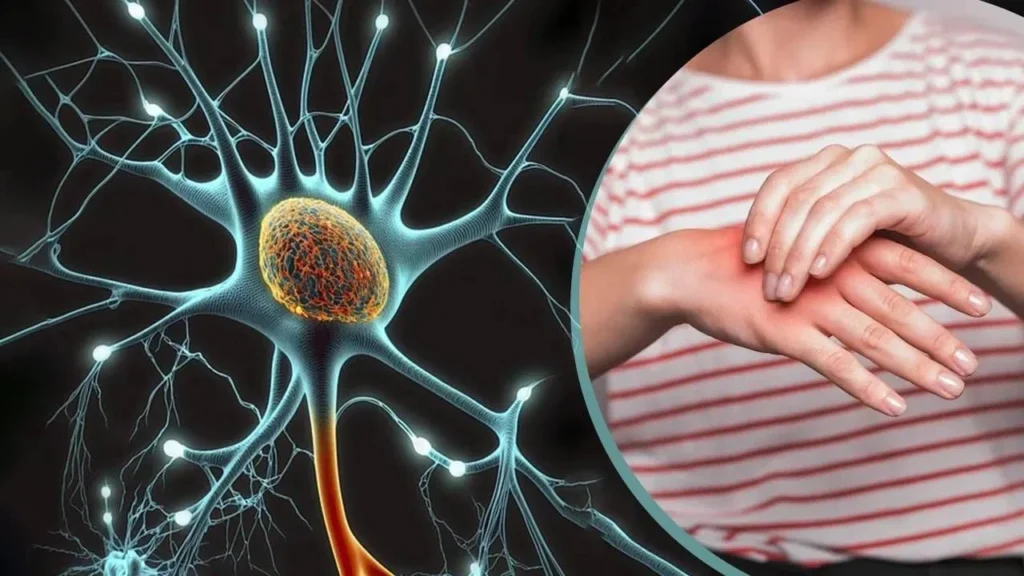
Guillain-Barre Syndrome (GBS) is a rare autoimmune disorder where the body’s immune system mistakenly attacks the peripheral nerves. This can lead to a range of symptoms that vary in severity and progression. Here’s a detailed look at GBS, including its symptoms, causes, precautions, treatment, complications, and frequently asked questions.
Symptoms of GBS
GBS typically begins with symptoms such as tingling and weakness in the feet and legs, which can spread to the upper body and arms. As the condition progresses, the muscle weakness can become more pronounced, leading to difficulty walking, climbing stairs, or even paralysis in severe cases. Here are the common symptoms of GBS:
- Tingling or pins-and-needles sensations in the fingers, toes, ankles, or wrists.
- Weakness in the legs that spreads to the upper body.
- Difficulty with facial movements, including speaking, chewing, or swallowing.
- Double vision or difficulty moving the eyes.
- Severe pain that may feel achy or cramp-like, often worse at night.
- Rapid heart rate and fluctuating blood pressure.
- Loss of bladder control or bowel function.
- Breathing difficulties, which can become severe enough to require mechanical ventilation.
Causes of GBS
The exact cause of GBS is unknown, but it often follows infections or medical events that trigger the immune system. Some common triggers include:
- Infections: Respiratory or gastrointestinal infections caused by bacteria or viruses, such as Campylobacter jejuni, influenza, cytomegalovirus (CMV), Epstein-Barr virus (EBV), and Zika virus.
- Surgery: Recent surgical procedures may sometimes precede the onset of GBS.
- Vaccinations: In rare cases, certain vaccines may trigger GBS.
- Other medical conditions: Conditions like lymphoma and systemic infections may also act as triggers.
Precautions to Prevent GBS
While it’s challenging to prevent GBS entirely, you can reduce the risk of infections that may trigger the syndrome by following these precautions:
- Drink boiled or bottled water.
- Wash fruits and vegetables thoroughly before eating.
- Properly cook poultry and meat.
- Avoid raw or undercooked food, especially salads, eggs, kebabs, or seafood.
- Keep raw and cooked foods separate.
- Disinfect kitchen surfaces and utensils after handling raw meat.
- Frequent hand washing with soap, especially before eating and after using the toilet.
Treatment of GBS
While there is no cure for GBS, treatments can help speed up recovery and reduce symptoms. The main treatments for GBS include:
- Intravenous Immunoglobulin (IVIG): This involves giving high doses of immunoglobulin through a vein to reduce the immune system’s attack on the nerves.
- Plasmapheresis (Plasma Exchange): This procedure involves removing and separating plasma from your blood cells to remove the antibodies that are attacking your nerves.
- Supportive Care: This includes monitoring and managing symptoms, such as pain relief, physical therapy, and nutritional support.
- Hospitalization: Severe cases may require intensive care, including mechanical ventilation if breathing muscles are affected.
Complications of GBS
GBS can lead to several complications, especially if not promptly treated. These complications include:
- Breathing difficulties: Severe cases can cause paralysis of the muscles that control breathing, requiring mechanical ventilation.
- Heart and blood pressure problems: Abnormal heart rate and fluctuating blood pressure.
- Loss of bladder or bowel control: Difficulty controlling bladder or bowel functions.
- Prolonged recovery: Some individuals may experience lasting effects such as weakness, numbness, or fatigue.
- Death: In rare cases, GBS can be life-threatening.
Frequently Asked Questions (FAQs) About GBS
1. What is Guillain-Barre Syndrome (GBS)?
GBS is a rare autoimmune disorder where the body’s immune system attacks the peripheral nerves, leading to muscle weakness, tingling, and, in severe cases, paralysis.
2. What causes GBS?
The exact cause of GBS is unknown, but it often follows infections or medical events that trigger the immune system, such as respiratory or gastrointestinal infections, surgery, and, in rare cases, vaccinations.
3. What are the early symptoms of GBS?
Early symptoms of GBS include tingling and weakness in the feet and legs, which can spread to the upper body. Other early signs may include difficulty with facial movements, severe pain, and rapid heart rate.
4. How is GBS diagnosed?
GBS is diagnosed through a combination of patient history, physical examination, and tests such as nerve conduction studies, electromyography (EMG), and lumbar puncture (spinal tap).
5. Can GBS be cured?
There is no cure for GBS, but treatments such as intravenous immunoglobulin (IVIG) and plasmapheresis (plasma exchange) can help reduce symptoms and speed up recovery.
6. How long does recovery from GBS take?
Recovery from GBS can vary widely, from weeks to years. While most people recover fully, some may experience lasting effects such as weakness, numbness, or fatigue.
7. Is GBS life-threatening?
In rare cases, GBS can be life-threatening, particularly if it leads to severe breathing difficulties. Prompt medical treatment is essential to manage symptoms and prevent complications.
8. Can GBS recur?
Recurrence of GBS is rare, but it is possible. Patients who have experienced GBS should be monitored for any signs of recurrence.
Conclusion
Guillain-Barre Syndrome (GBS) is a serious condition that requires immediate medical attention. Understanding the symptoms, causes, precautions, treatment, and potential complications of GBS can help individuals seek early diagnosis and treatment, improving their chances of recovery. If you suspect GBS, don’t hesitate to reach out to a healthcare professional for evaluation and care.




